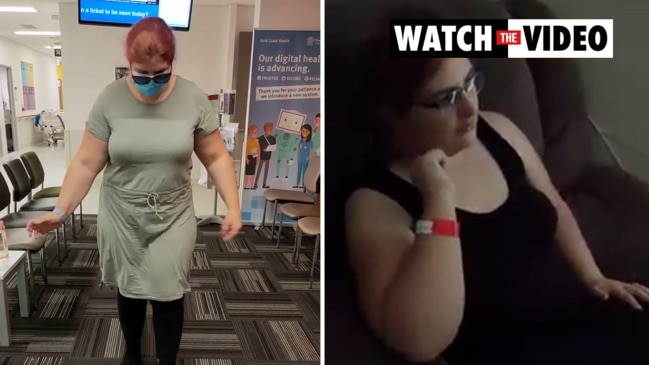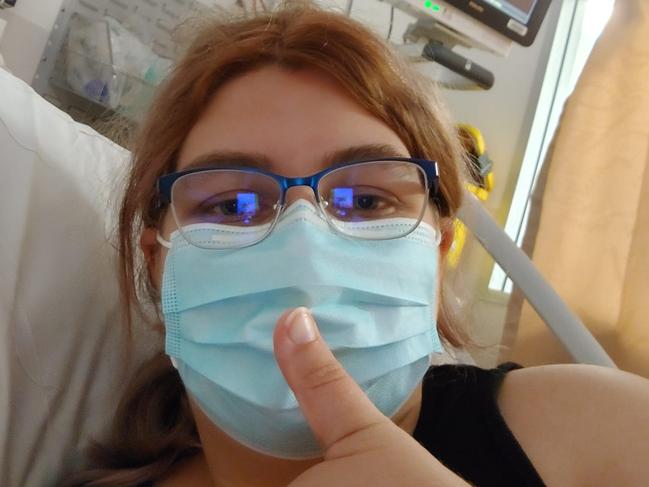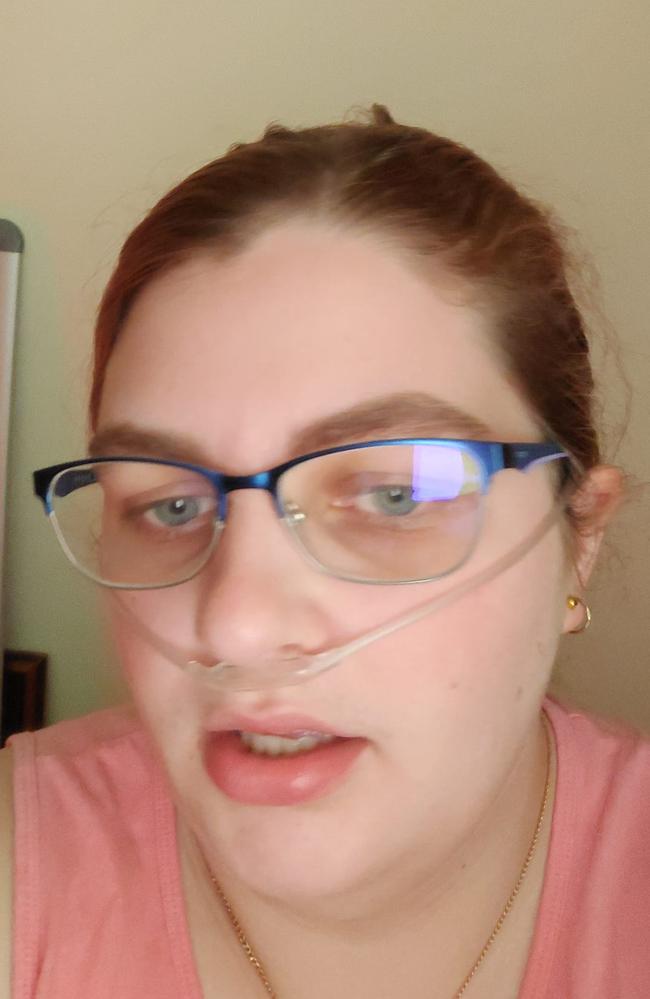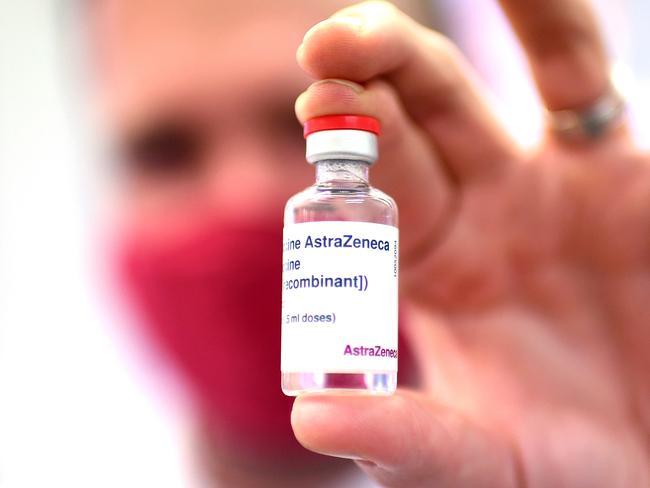Woman diagnosed with rare neurological disorder following Covid vaccine
A Queensland woman who started shaking involuntarily just hours after receiving her first dose of a Covid vaccine has been diagnosed with a rare neurological disorder. SEE THE VIDEO.

QLD News
Don't miss out on the headlines from QLD News. Followed categories will be added to My News.
A Beenleigh woman has been diagnosed with a rare but treatable neurological disorder after she started shaking involuntarily just hours after receiving her first dose of a coronavirus vaccine.
Several videos taken over the past few months show Roisin-Dee Hadfield-Lowe, 23, trying to walk or watch TV as her hands, arms or legs shake or twitch with involuntary tremors, something she says only started four hours after receiving a Covid-19 vaccine on March 27.
The pro-immunisation TAFE nursing student said she was more than happy to receive the vaccination in preparation for an upcoming practical placement at a Gold Coast hospital.
But, Miss Hadfield-Lowe, now 24, said four hours later her arms started to shake involuntarily before progressing to her legs.
“I started to be unable to speak coherently. Dad was trying to talk to me but he said it was like no-one was there,” she said.
“I started twitching and convulsing and having trouble breathing.
“I was hyperventilating a lot. I was in and out of knowing what was going on.”

By March 29, the student said she was experiencing full body tremors, starting a months-long process of hospital and doctor visits to determine the cause of the ongoing symptoms.
A medical certificate signed by Miss Hadfield-Lowe’s GP in April described the physical reaction as “Damage to sympathetic nervous system – side effect of AstraZeneca Covid vaccination.”
Although Miss Hadfield-Lowe’s family have reported the symptoms as adverse reaction to the Australian Therapeutic Goods Administration (TGA) for investigation, the possible connection to the Covid-19 vaccine has not yet been definitively ruled in or out by her neurologist or other specialists.
A TGA spokeswoman said seizures and tremors were not recognised adverse events following vaccination with Pfizer or AstraZeneca because there was “not sufficient evidence to conclude the vaccines could cause the events.”
Some of Miss Hadfield-Lowe’s symptoms were similar to ones displayed by a handful of different people around the world following their Covid shots, though they all received different brands of the vaccine, according to several recent medical studies.

Months later, they, and Miss Hadfield-Lowe, were subsequently diagnosed with functional neurological disorder (FND).
FND is a condition where there is a problem with the functioning of the nervous system and how the brain and body sends and receives signals, according to the US National Organisation for Rare Disorders.
It can encompass a wide variety of neurological symptoms, such as limb weakness or seizures, and is also considered to be a condition with links between the specialties of neurology and psychiatry.
Medical experts claim that vaccines were one of several potential triggers of the rare condition in some people, but that it was not a specific reaction to any ingredients in any of the Covid vaccine brands and not exclusive to the coronavirus vaccination.
They said FND had occurred in people following other types of vaccines over the years and was most likely to appear in people unknowingly predisposed to the condition.
In a study titled ‘Helping the public understand adverse events association with Covid-19 vaccinations’ published in the Journal of the American Medical Association of Neurology (JAMA) in April, Boston neurologist David Dongkyung Kim said while FND symptoms were real, they were not directly caused by ingredients in or from the vaccines themselves.
“FND can be triggered by physical and/or emotionally valenced events, including head injury, medical/surgical procedures, and vaccinations (sic),” he wrote.
Miss Hadfield-Lowe, who is now trialling some medication to assist with recovery, describes the involuntary shakes as similar to “Tourette’s-like jerks” or those found in people with Parkinson’s disease.


She said she became frustrated and angry in the first week of the symptoms appearing as emergency department doctors told her the physical movements were likely a result of stress.
The Logan resident, who sought other opinions, insists she was not under any stress, nor did she have a fear of needles.
“I was as normal as anyone can be before that day,” she said.
“Now, I’ve had to stop studying and I rarely leave the house.
“If I do, dad or mum have to chauffer me.”
According to three separate neurology studies published this year in different medical journals, some of the symptoms reported by people from the US, Canada, Hong Kong, Italy and the UK after their Covid vaccination have ranged from bilateral facial paralysis to uncontrollable shaking, tongue spasms, weakness in one side of the body and more, with some symptoms coming and going over months.
The men and women referenced in the studies were in their 30s and 40s.
At least two of the women diagnosed with FND had received the Pfizer vaccination, another woman had received the Moderna brand, one had the AstraZeneca and a Hong Kong man received the Chinese-made Sinovac vaccine in March, while a brand was not specified for a 41-year old Italian man.
In Australia, reports of adverse events are publicly available on the Database of Adverse Event Notifications (DAEN).

The TGA spokeswoman said, despite tremors not being listed as an adverse event to the Covid vaccination, some results were found in a keyword search of two of the symptoms.
“For the reaction terms ‘seizure and tremor’ the DAEN includes 537 cases following Vaxzevria (AstraZeneca) and 225 reports following Comirnaty (Pfizer),” she said.
“Importantly, reporting and publication of an adverse event report in the DAEN does not necessarily mean that it is related to the medicine or vaccine.
“The event may have occurred regardless of vaccination.”
A study published August 18 in the Journal of Neurology, Neurosurgery, and Psychiatry titled ‘Functional disorders after COVID-19 vaccine fuel vaccination hesitancy’, stated the combination of a lack of awareness of FND and the prevalence of social media had helped spread misinformation that FND-connected symptoms were a perceived side effect from the new vaccine.
“In the era of COVID-19 pandemic, many individuals have also to deal with the ‘infodemic’ challenge, a term coined by the (World Health Organisation) to refer to the ‘overabundance of information — some accurate and some not — that occurs during an epidemic’,” the report states.
“Misinformation in social media and conspiracy beliefs about COVID-19 pandemic are now enriched by the theories of anti-vaccine movements, in keeping with the notion that online false news stories spread more rapidly than true news.”
Miss Hadfield-Lowe – who still supports people getting vaccinated – said she wanted to help educate others on the possibility of rarer side effects occurring.
“I just wanted to make sure people know there are more sides effects than just possible blood clots,” she said.
“All reactions do not happen to everyone … but don’t be afraid to get a second opinion.”


